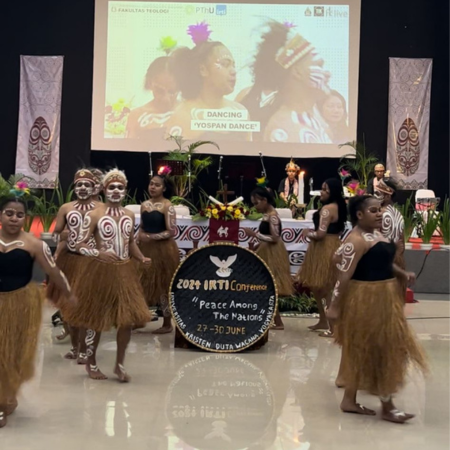Blog: ‘Bravely choosing to keep dancing’
Upon arrival on the first day of the 15th IRTI biennial conference, soothing classical music sounds in the background. Students and faculty from all walks of life mingle in a very convivial atmosphere. Suddenly, upbeat music catches their attention and the vibe changes. A dozen young people appear in the middle of the room, in skirts and headgear, their bodies decorated with motif paintings and necklaces. The music makes it almost impossible to stay in your seat. They perform a traditional Papuan welcome dance for us. After this enthusiastic welcome, the dancers leave the hall.
Blog by Ilse Almekinders
Integration
After reading various passages on peace from the holy scriptures of different religions followed by music and prayer, the dancers return. With graceful movements, they move to the center of the hall and perform a dance called the Yospan dance. After repeating this dance several times, a number of conference participants are randomly chosen to dance with them. It is a beautiful sight: two people from completely different cultures, who become attuned to each other and to the rhythm of the music while dancing. The Yospan dance is said to be a contemporary dance depicting friendship. According to the information I found, it is a combination of two Papuan folk dances, namely Yosim and Pancar. The Yosim dance is all about freedom: freedom and agility of dance movements. Pancar is a dance developed in the early 1960s when Papua was under colonial rule. The acrobatic movements are thought to refer to the planes that traversed Papua's skies at that time. It was fascinating to see freedom and domination, two diametrically opposed themes, integrated into one dance.
Studies linked to colonialism
Today's key word happens to be (post-)colonialism. Many contemporary conflicts stem from colonial pasts or were intensified by colonial interventions, and in many cases this still affects people worldwide today. During the pre-symposium-- as a kind of warm-up for our four conference days-- three studies were presented that were linked to the theme of colonialism. Both theology students and faculty from Sumatra and Papua were asked about their knowledge and perception of colonialism, as were Dutch theology students.
Theology lecturers see colonialism fundamentally as a criminal practice against humanity, because it includes power relations, supremacy, domination and exploitation. The students largely share the views of the lecturers and, in addition, indicate fear and (subsequent) trauma as an effect of being colonized. Anger is also mentioned, because the victims were suppressed and their culture was replaced by another. In the survey of Dutch theology students on perceptions of colonialism, they indicated that in some cases they distanced themselves from history because they did not feel responsible for what their ancestors did in the colonial era. Nevertheless, students mostly felt shame and guilt. However, shame and guilt can be unproductive emotions if they do not encourage action, such as standing up for the vulnerable people in society. Ultimately, thought determines action. These studies also raised the question of the theological relevance of colonial history, how it shaped the participants as human beings and how it does or does not affect their view of others.
How God works in situations of war and persecution
Last but not least, Hanns Lessing (World Communion of Reformed Churches) reflected on the role of Reformed theology in a postcolonial era. Reformed churches, supported by Reformed theologians, often justify wars for a variety of theological reasons, emphasizing God's sovereignty or that it is 'for the common good', whatever that might mean exactly. There are many factors that contributed to the long, complex Reformed tradition, which incidentally proves difficult to define in practice. In any case, Calvin had a significant influence. He speaks of spiritual warfare. He tries to understand how God works in situations of war and persecution. In his letter to the monastic community of Aix in 1561, Calvin recognises the value of a law that legitimizes the use of arms under well-defined circumstances. However, he does not encourage Christians to take up arms even if the law allows it. He argues that when Christians resist evil through the power of weapons, they prevent God from coming to their aid. The conclusion of the keynote is that the Reformed contribution lives by the tensions it attracts and the paradoxes it propagates. Reformed theology keeps the political debate going and creates space through which peace can flourish in the midst of nations.


